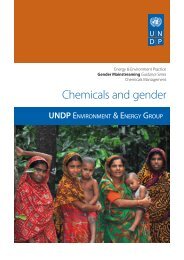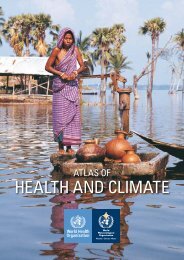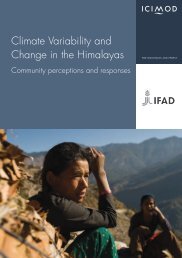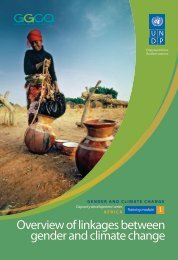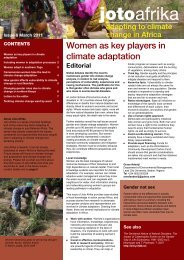Module 4: Gender, Agriculture and Food Security - Gender Climate
Module 4: Gender, Agriculture and Food Security - Gender Climate
Module 4: Gender, Agriculture and Food Security - Gender Climate
- No tags were found...
Create successful ePaper yourself
Turn your PDF publications into a flip-book with our unique Google optimized e-Paper software.
• Promote adapted farming systems, the use of water- <strong>and</strong> soil-conservation<br />
techniques, reforestation <strong>and</strong> sustainable resource management.<br />
• Improve women’s access to l<strong>and</strong> ownership; develop awareness raising<br />
programmes within communities <strong>and</strong> among those involved in development<br />
at local, regional <strong>and</strong> national levels. Promote the amendment of laws to grant<br />
women the right to ownership.<br />
• Promote women’s access to agricultural-extension services <strong>and</strong> training on<br />
farming adaptation techniques. Improve women’s access to credit <strong>and</strong> the<br />
inputs needed to increase agricultural yield.<br />
• Promote access for both men <strong>and</strong> women farmers to information about the<br />
climate, including weather forecasts, so that they can decide on the best time<br />
to plant seeds.<br />
• Promote suitable frameworks <strong>and</strong> tools for analysing interactions between<br />
climate change <strong>and</strong> development, with a view to consistently incorporating<br />
climate change into planning at national, regional <strong>and</strong> local levels.<br />
• Support a long-term assessment of the NAPA <strong>and</strong> the rewriting of a<br />
programmatic, fairer <strong>and</strong> gender-sensitive NAPA.<br />
At organisational level<br />
• Work on identifying <strong>and</strong> eliminating factors that limit women’s capacity to<br />
adapt. Give women training so that they can develop their adaptation skills, <strong>and</strong><br />
promote medium- <strong>and</strong> long-term strategic changes in order to achieve greater<br />
gender equality.<br />
• Promote participation by women in the planning <strong>and</strong> carrying out of<br />
adaptation measures so that their needs <strong>and</strong> priorities are taken into account.<br />
• With regard to adaptation, work on adaptation measures with a view to<br />
responding to known risks (heavy <strong>and</strong> irregular rain <strong>and</strong> extreme events) <strong>and</strong><br />
information on weather conditions (rainfall measurement) so that people can<br />
be better prepared.<br />
• Promote women’s access to adaptation techniques: water- <strong>and</strong> soil-conservation<br />
techniques, use of improved seeds, diversification of crops, composting<br />
<strong>and</strong> horticulture.<br />
• Strengthen women’s organisations in rural communities <strong>and</strong> support their<br />
participation in the planning <strong>and</strong> carrying out of adaptation measures so that<br />
their needs <strong>and</strong> priorities are taken into account. Promote active participation<br />
in community decision making.<br />
• Develop credit <strong>and</strong> storage systems to support families during the period<br />
between harvests so that they do not have to sell their capital to buy food when<br />
market prices are higher.”<br />
26<br />
<strong>Gender</strong> <strong>and</strong> <strong>Climate</strong> Change Capacity development series Afric a<br />
Training module 4 <strong>Gender</strong>, agriculture <strong>and</strong> food security



